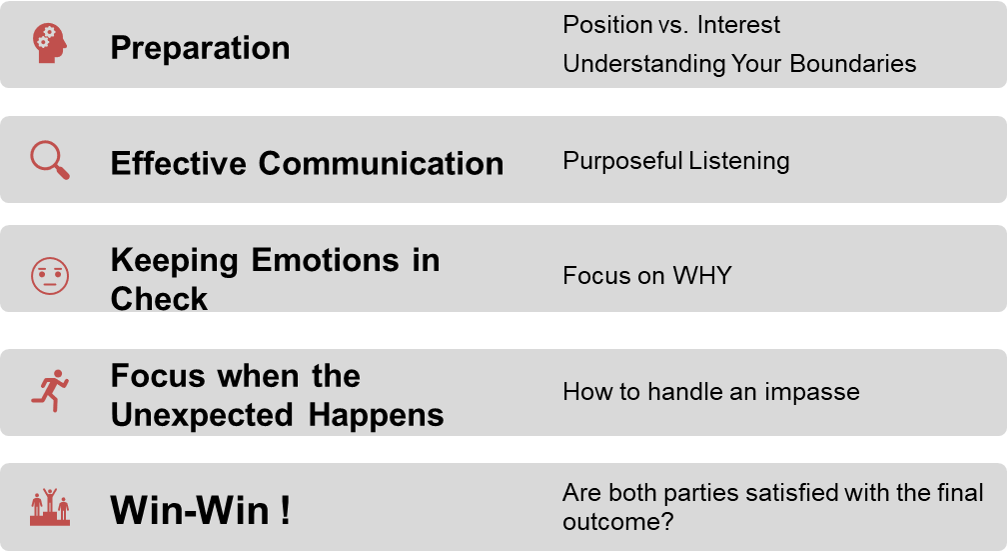| STAGES OF A NEGOTIATION |
|
 |
| ABOUT NEGOTIATIONS |
|
Critical Elements of Negotiations
- Information
- Power
- Time
|
What is a Negotiation?
Discussion aimed at reaching an agreement, and everything that occurs leading up to the agreement.
When do we Negotiate?
Nearly everyday. There is negotiation practices in play in almost every decision you make with your team.
|
| POSITIONS VS. INTERESTS |
|
|
Understanding negotiations first comes with understanding the differences in Positions vs. Interests.
POSITIONS: Surface statements where a person or organization stands. They rarely provide insight into underlying motivations, values, or incentives.
INTERESTS: A party's underlying reasons, values or motivations. Interests explain WHY someone takes a certain position.
|
|
Don't get caught up in arguing with someone about their position. Focus on trying to understand their interest and come to an agreement without trying to convince them to change their identity.
|
| PREPARING FOR NEGOTIATIONS |
|
Trade-Offs and Alternatives
- Prioritize your goals; Where can you give?
- What scenarios / outcomes are you willing to accept? Why?
- How will these outcomes affect the other side?
- Understanding the other sides situation will garner more respect during the negotiation.
- Will they be criticized? Will this create negative perceptions? Will there be a loss of support from constituents / sponsors?
- Put yourself in their shoes. Try to gain understanding of why they are in the position they're in.
|
-
- Quid-Pro-Quo: 'Throw a bone' in exchange for something that you need.
- Evaluate the possible outcomes thoroughly. Play them out and make note of how certain groups are affected. It is important to focus on others. Remember that the team, supervisors, subordinates will be impacted by the outcome of this negotiation.
- Create a scale of the potential outcomes and identify the best/worst case scenarios.
- Don't forget to to consider the short-term impact. Sometimes the immediate gratitude takes over and we lose sight of the bigger picture.
|
Relationships
- What is your relationship with this person or group?
- How will this negotiation affect it?
- Who has the power and why?
- Who stands to lose the most?
|
- Remember: We have individual relationships the ME, we have corporate relationships the Brinkmann Constructors
- How will the possible outcomes affect these relationships? What is at stake beyond the immediate issue?
- Do we have the power over our subcontractors? What type of partnership/leadership do they respond best to?
- Know your audience/person/company
- Do Owners have power over us? What kind of partnership is it? Is there a partnership at all?
|
Expected Outcomes
- Is there an outcome you are expecting to attain?
- Have there been previous negotiations with this person/company? What were those outcomes?
- Were any precedents set? What are the parameters
- What behaviors can be identified from before?
- How do the answers to all thee questions shape our strategy/plan?
- Use all of the above gained knowledge to leverage during the negotiation
|
- Are you treading on sacred ground?
- Are you/we creating new precedents?
- Consider the short term vs. long term impacts
- Is there history involved?
|
Consequences
- What are the direct consequences for YOU?
- What are the direct consequences for BRINKMANN?
- What are the direct consequences for others?
- Identify opportunities for value.
- Use the positive moments to gain traction and leverage when appropriate
- Do not be too pushy. Do not be perceived as a bully.
|
- Is WIN-WIN possible? Do we care?
- Do we want this? Do they want this?
- Objective Criteria vs. Subjective Criteria
- By pointing out the objective items you can appeal to the subjective items without seeming like you are attacking them. Point out facts - NOT opinions.
|
| PURPOSEFUL LISTENING |
|
Poor Listening Habits Include:
- Not paying attention (pseudo-listening)
- Rehearsing your response
- Interrupting
- Feeling defensive
- Listening for a point of disagreement
- Focusing on the person, not the message.
|
Combat Poor Listening By:
- Identify Bad Habits of Listening
- Choose a proactive way to listen more effectively according to your report
- Practice! Practice! Practice!
|
Predisposition
How willing am I to listen?
Ask Yourself: How can I keep from forming an opinion, interrupting before hearing all of the story?
Action: Practice Silence.
Conductive Climate
How much do I create a listening environment?
Ask Yourself: What is the best environment for me to really hear someone?
Action: Be proactive about the setting for listening when at all possible.
Positive Interest
How much do I show interest in the speaker?
Ask Yourself: How can I create genuine interest in the person who is communicating
Action: Keep eye contact, stay open or neutral with your body.
Reading the Speaker
How much do I try to understand what is behind the words being spoken?
Ask Yourself: What is the deeper message that may be beneath the words?
Action: Use checking questions to dive deeper.
Empathizing
Am I committed to understanding the person's ideas and feelings?
Ask Yourself: What might I think if I was in their position?
Action: Try seeing things from their point of view as well!
Paying Attention
Do I maintain focus while listening?
Ask Yourself: What can I do to focus my attention?
Action: Use questions to stay alert, keep distractions at bay anyway possible.
Understanding and Reflecting
Do I interpret what is being said and confirm with the speaker?
Ask Yourself: What is the key message the speaker is communicating?
Action: Practice summarizing when listening.
|